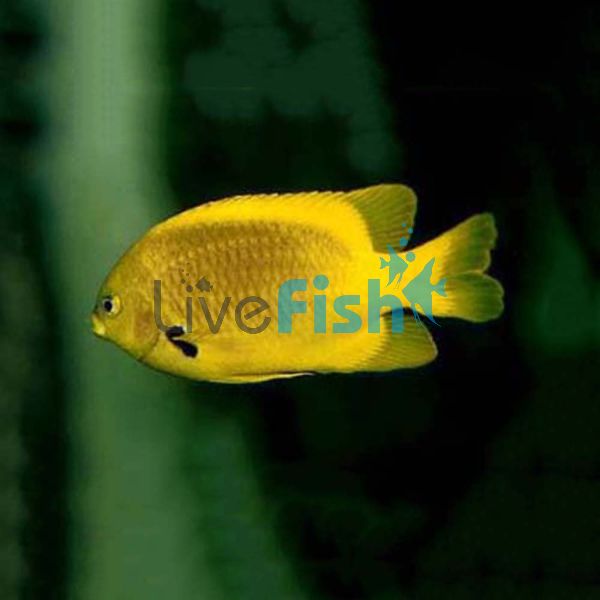Heraldi Angelfish - Small
This species of dwarf angelfish is a bright yellow color all over but some variants may have a dark area on top that usually fades during captivity. They are often confused with their cousin the Lemon Peel Angelfish. They can be distinguished by the lack of a blue ring around the eyes. They will swim around the bottom half of the tank-like tiny flashes of sunshine.
The males of the species can sometimes develop dark areas with yellow dots behind the eyes when fully matured. Herald's Angel Fish has not shown any signs of reproduction in captivity as of yet.
As with all angelfish, there is some risk to coral when keeping them. Their ability to consume algae and detritus makes this challenging fish very rewarding for the intermediate aquarium owner.
Heraldi angelfish are found all over the Pacific ocean from Taiwan to Southern Japan and the Great Barrier Reef. They have usually seen in a group of 1 male and 3-4 females although have been spotted in pairs too. They inhabit lagoon patches and reef/rubble slopes from 5-90 meters deep.
Tank Recommendations for the Heraldi Angelfish
The smallest tank size for this species is 210 liters for a single fish, which must be increased if more females are added.
These fish will spend most of their time swimming around the bottom so a tank that is longer rather than taller is generally preferred.
Due to the grazing nature of Heraldi Angelfish, they should only be added to a tank that is at least 6 months old and well established. This gives the algae plenty of time to accumulate and provide for the fish's nutritional needs. Lots of live rock and places to hide are essential.
Suitable Tank Buddies
Although this species is slightly more passive than its other dwarf angelfish cousins, care should still be taken to only keep them with smaller peaceful or only semi-aggressive fish. Bigger peaceful fish are fine too but avoid adding anything that may cause them stress.
Usually Compatible
Larger Angelfish, Basslets, and Butterflyfish would make a good choice here. They should get along fine with the Cardinals, Clownfish, and Damsels. Hawkfish, Parrotfish, Tangs, and Pufferfish will make great tank buddies as well.
Sometime Compatible
Take care when housing with other Dwarf Angelfish and only do so with a sufficiently large enough tank. Eels, Lionfish, and Rays should be monitored carefully. Live coral and invertebrates may get nipped at too.
Rarely Compatible
Seahorses are a no-go along with Pipefish too as the angelfish will out-compete them for food which could mean they starve. Sharks will see the Herald's Angelfish as prey so they should also be avoided.
Feeding Your Heraldi Angelfish
This species of Dwarf Angelfish is an omnivore, but most of its diet needs to come from plant matter. There should already be plenty of algae growing in the tank when you add the fish for it to graze on. Spirulina and sponge material will go down well too. Meaty foods such as mysis shrimp and other marine flesh can be given sometimes as they will eat small crustaceans in the wild but this is not necessary. Feed them 2-3 times along with all the naturally occurring algae on the live rocks.
| Scientific Name | Centropyge Heraldi |
|---|---|
| Care Level | Moderate |
| Common Names | The Heraldi Angelfish, False Lemon Peel and Herald's Angelfish |
| Diet | Omnivore |
| Fish Family | Pomacanthidae |
| Lifespan (years) | 10 |
| Max. Length (cm) | 13 |
| Min. Tank Volume (l) | 210 |
| Origin | Pacific |
| Reef Safe | No |
| Sociability | Peaceful |
| Venomous | No |
| Water Conditions | 22 - 28°C, dKH 8-12, pH 8.0-8.4, sg 1.023-1.025 |




